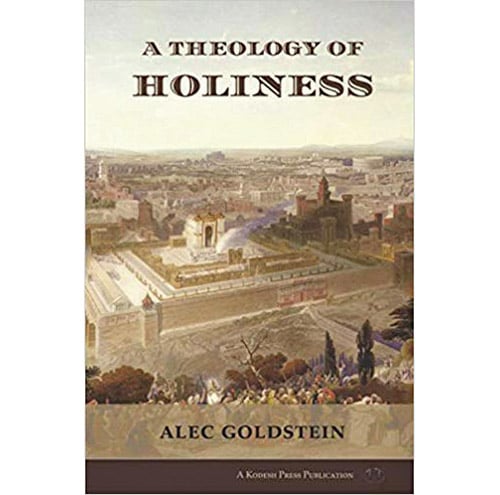
Reviewing: A Theology of Holiness: Historical, Exegetical, and Philosophical Perspectives, Kodesh Press, 2018, by Rabbi Alec Goldstein.
In this wonderful masterpiece, Rabbi Alec Goldstein considers the meaning of a term ubiquitous to the Bible but not readily understood: kedushah. While we tend to translate kedusha as “holy” or “sacred,” that hallowed concept is not truly explained by those hollow words. Rabbi Goldstein—the proprietor of the aptly titled Kodesh Press—attempts to give meaning to this concept and clarify what is exactly meant by the word kedusha.
The first third of Rabbi Goldstein’s book considers the meaning of kedusha in linguistic terms, and begins by seeking out the etymology of the Hebrew root kuf-dalet-shin and its Semitic cognates. Some argue that kedusha is derived from the verbs “to separate” or “to cut,” while others connect kodesh with chadash (“new”). A third view considers the core meaning of kedusha to be “conflagration.” Finally, Rabbi Goldstein cites authorities who maintain that kedusha itself is not derived from any other root, but is an original three-letter root on its own.
Rabbi Goldstein’s linguistic analysis continues by searching for the meaning of kedusha via contrasting it with its antonyms in the Bible—namely, chillel (“defile”) and tamei (“impure”). By clarifying the concepts antithetical to kedusha one can reach a better appreciation of what exactly kedusha itself entails. The final chapter devoted to the linguistic aspect of kedusha highlights the words commonly found in the Bible in tandem with kedusha and its cognates. This chapter uses those counterpart concepts found alongside kedusha to hone in on the exact meaning of kedusha.
The next bulk of Rabbi Goldstein’s gem mines through the Bible and provides a thematic survey of the different contexts in which the concept of kedusha is invoked. These include places, times and items that are said to be imbued with kedusha—and, of course, God and the Jewish people who are said to be kadosh. The Bible clearly associates kedusha with the abstinence from inappropriate sex, food and idolatry, and Rabbi Goldstein explores the common denominator between those three elements.
Rabbi Goldstein then contemplates the implications of kedusha from a philosophical perspective. Besides drawing from the timeless wisdom of the Talmud, Rabbi Goldstein reflects upon several approaches proffered by such medieval authorities as Rashi, Maimonides, Nachmanides, Gersonides and R. Yehudah ha-Levi, as well as more recent Jewish thinkers such as R. Samson Raphael Hirsch, R. J.B. Soloveitchik and Eliezer Berkovits. He also considers the concept of kedusha from the perspectives of German philosophers Immanuel Kant and Rudolf Otto.
What emerges from those viewpoints is that some understood kedusha to be commensurate with following specific precepts of the Torah, or even the Torah as a whole, while Nachmanides clearly understood that kedusha refers to extra-legal asceticism that requires abstaining from that which is permitted by the letter of the law. Others define kedusha as referring to objective morality or ethics, while a slightly more esoteric definition of kedusha refers to imitatio Dei, the imitation of God.
Throughout his scholarly dissertation, Rabbi Goldstein strives to remain loyal to the text of the Bible, as well as to Jewish tradition. Nonetheless, this textual positivism does not bar him from looking beyond the Bible and classical Jewish works. In fact, Rabbi Goldstein’s work demonstrates that its author’s mastery is not limited to Jewish rabbinic sources, but also includes Jewish Hellenistic sources and works of Greek philosophy. Rabbi Goldstein is also clearly familiar with epigraphical texts found by archaeologists, and uses them to buttress his arguments when appropriate.
Despite the book’s title, “A Theology of Holiness” does not offer one specific theological presentation of the concept of kedusha. Rather, it provides the reader with a kaleidoscope of views on the matter, giving much fodder for further discussion and consideration. In the end, the exact definition of kedusha eludes us, but with this book in hand we are much more knowledgeable about the matter.
Rabbi Reuven Chaim Klein is the author of “God versus Gods: Judaism in the Age of Idolatry” (Mosaica Press, 2018). He studied for over a decade at such premier institutes as Yeshiva Gedolah of Los Angeles, Yeshivas Mir in Jerusalem, and Beth Medrash Govoha in Lakewood, NJ. He currently lives in Beitar Illit, Israel, where he continues to deliver lectures and publish articles in rabbinic and academic journals. He can be reached via email at rabbircklein@gmail.com.











